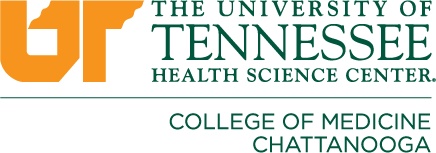GME Institutional Policies
Alphabetical Listing of Key GME Institutional Policies for the UTHSC College of Medicine - Chattanooga
- Academic Appeals and Due Process [#720]
- Academic Performance and Improvement Actions [#705]
- Accommodation for Disabilities [#160]
- ACGME Accreditation and CLER [#300]
- Annual Resident Agreement of Appointment [#120]
- Clinical Competency and Quality Improvement Committee (CCC) [#640]
- Clinical and Educational Work Hours [#330]
- Clinical and Educational Work Hours Logging and Monitoring [#335]
- Criminal Background Checks [#130]
- Code of Conduct [#UT System HR0580]
- Disaster [#550]
- Disciplinary and Adverse Academic Actions [#700]
- Drug/Alcohol Use and Pre-Employment Testing [#740]
- Drug Free Campus and Workplace [#UTHSC 720]
- Establishing Personal Primary Care Physician, Refraining from Treating Self and Family, and Refraining from Providing Primary Care for Other Residents or Medical Students [#290]
- Fatigue Management and Stress Education [#340]
- Fitness for Practice and Drug/Alcohol Testing for Reasonable Suspicion [#745]
- GME Confidential Comments Form
- GME Exposure Process (e.g., Resident Needlesticks)
- GME Institutional Well-Being [#222]
- GME Insurance Benefits [#230]
- GME Leave Policy [#250]
- Grievances [#730]
- Handoffs and Transitions of Care [#360]
- Immunity from Professional Liability vs Malpractice [#280]
- Licensure Exemption and Prescribing Information [#260]
- Loan Deferment [#270]
- Meal Cards and Cafe' Hours [#200]
- Medical Licensing Examination Requirements (USMLE or COMLEX) [#630]
- Moonlighting [#350]
- New Innovations Policies and Procedures [#060]
- Observing Requests [#185]
- Offsite Rotation Approval for UTCOM-C Residents [#530]
- Physician Health Support Policy [#320]
- Professional GME Dress Code Policy [#240]
- Program Closure and Reduction [#540]
- Program and Faculty Evaluation (New Innovations Procedures) [#600]
- Program and Educational Goals and Objectives [#510]
- Quality Improvement and Patient Safety [#380]
- Reappointment, Promotion, Non-Reappointment, and Termination [#620]
- Reporting UT Resident TIme Off [#255]
- Resident Evaluation including Final Summative Evaluation [#610]
- Resident Learning and Work Environment [#310]
- Resident Non-Compete [#125]
- Resident Recruitment Selection and Appointment Guidelines [#100]
- Resident Supervision [#400]
- Resident Supervision Standards in Patient Care Settings [#405]
- Resident Supervision and Procedures by Program and by Resident
- Resident Support Services [#225]
- Resident Transfers [#170]
- Resident Travel, Professional Development, and Reimbursement [#750]
- ScrubEx System [#245]
- Severe Weather [#760]
- Sexual Harassment [#410]
- Social Media Guidelines [#430]
- Special Focused Review Protocol [#660]
- Stipends [#220]
- Stipend Level [#221]
- Technical Standards [#150]
- Workers Compensation - UT Risk Management Website and click on Report an Incident to Initiate and Complete the WC Reporting Process
- Vendor and Industry Relationships [#800]
- Visas [#140]
- Visiting Resident Approval [#180]
- Visiting Resident Approval Form [#181]
- UTHSC Consensual Relationships
- UTHSC College of Medicine MERL (Medical Educator Resource Links)
- UTHSC College of Medicine Student Mistreatment
- ACLS, BLS, PALS, and Neonatal Resuscitation Pocket Card Resources
- GME Exposure Process (e.g., Resident Needlesticks and Other Bloodborne Pathogen Exposures)
********************
EXPOSURES, NEEDLESTICKS, AND UT WORKERS' COMP
- Reporting Needlesticks, Other Exposures, or Incidents - requires reporting it to two
(2) different systems:
- The hospital in which the exposure or incident occurred (usually Erlanger) and
- The UT Risk Management Workers' Comp Reporting Process.
- Notify the hospital administration first, then complete a brief hospital non-employee
incident/exposure form. Contact the hospital House Supervisor at 423.778.6168 or call the Erlanger Operator
at 423.778.7000 to page the Erlanger House Supervisor to call you.
-
-
- Be sure to alert the GME Office (423.778.3899 or 423.778.3894). Email rosalyn.stewart-kalaukoa@erlanger.org or nolan.english@erlanger.org as soon as possible after the incident or exposure (within 24 hours if possible).
- Also notify your Program Director and supervising faculty member as soon as you are
able to do so.
-
-
- Comply with the UT Risk Management Workers' Comp Reporting Process. This process provides step by step instructions for reporting any potential Workers'
Comp issue or claim. Note: For UT reporting, you should list your "Supervisor" with
the name of your Program Director or the Faculty Member who was supervising the Resident's/Fellow's
care of the patient involved in the incident being reported.
- Follow the links in the bullets listed above so you can review and reference as you
complete the reporting process for Erlanger and the University. Again, please contact
either of our GME administrative staff [Rosalyn Stewart-Kalaukoa or Nolan English] if you need assistance (phone #s 423.778.3894 or 423.778.3899).
- Review our UTHSC GME Policy: Exposure to Blood and Body Fluids Including Needlestick Protocol [#748]


